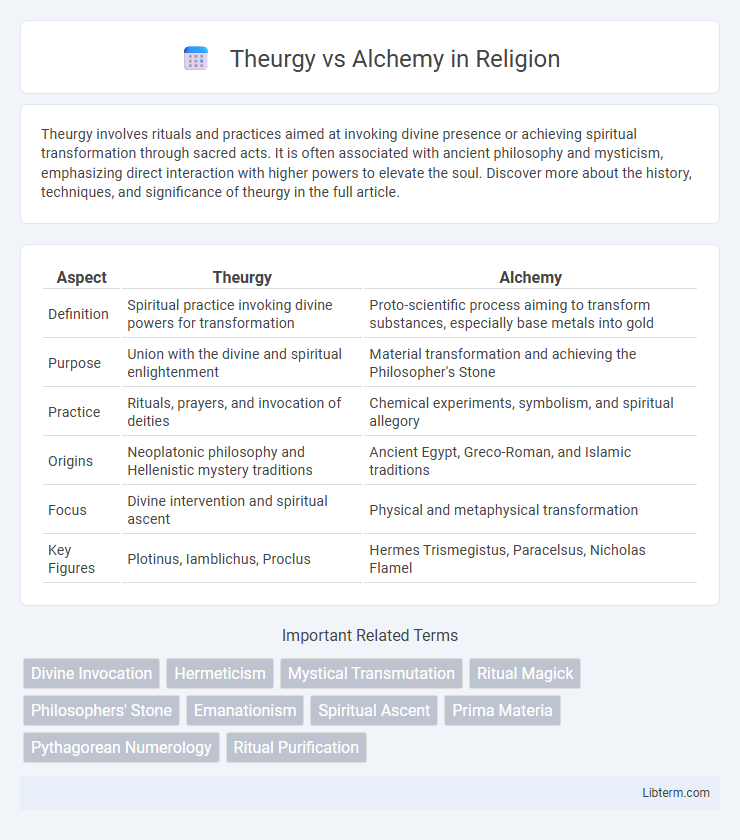Theurgy involves rituals and practices aimed at invoking divine presence or achieving spiritual transformation through sacred acts. It is often associated with ancient philosophy and mysticism, emphasizing direct interaction with higher powers to elevate the soul. Discover more about the history, techniques, and significance of theurgy in the full article.
Table of Comparison
| Aspect | Theurgy | Alchemy |
|---|---|---|
| Definition | Spiritual practice invoking divine powers for transformation | Proto-scientific process aiming to transform substances, especially base metals into gold |
| Purpose | Union with the divine and spiritual enlightenment | Material transformation and achieving the Philosopher's Stone |
| Practice | Rituals, prayers, and invocation of deities | Chemical experiments, symbolism, and spiritual allegory |
| Origins | Neoplatonic philosophy and Hellenistic mystery traditions | Ancient Egypt, Greco-Roman, and Islamic traditions |
| Focus | Divine intervention and spiritual ascent | Physical and metaphysical transformation |
| Key Figures | Plotinus, Iamblichus, Proclus | Hermes Trismegistus, Paracelsus, Nicholas Flamel |
Introduction to Theurgy and Alchemy
Theurgy and alchemy are ancient esoteric practices with distinct goals and methodologies. Theurgy focuses on invoking divine powers and spiritual beings to achieve enlightenment and spiritual transformation, emphasizing rituals and divine communion. Alchemy centers on the transformation of substances, aiming to transmute base metals into noble ones and discover the philosopher's stone, symbolizing both physical and spiritual purification.
Historical Origins and Development
Theurgy and alchemy both trace their origins to ancient mystical traditions but differ in purpose and practice; theurgy emerged primarily in Neoplatonism during the 3rd to 5th centuries CE as a spiritual discipline aimed at invoking divine forces for personal transformation. Alchemy began earlier, with roots in Hellenistic Egypt around the 1st century BCE, combining elements of metallurgy, chemistry, and philosophy to achieve material transmutation and spiritual enlightenment. Over time, theurgy maintained a focus on ritual invocation and the soul's ascent, while alchemy evolved into both an early scientific inquiry and a symbolic framework for inner transformation.
Philosophical Foundations
Theurgy centers on invoking divine powers to achieve spiritual transformation and union with the divine, rooted in Neoplatonic philosophy emphasizing the soul's ascent through divine interaction. Alchemy is grounded in Hermetic and proto-scientific principles, focusing on material transmutation and spiritual purification through the manipulation of natural elements. Both practices share a metaphysical framework where physical and spiritual realms intersect but diverge in methods and ultimate goals of enlightenment and transformation.
Core Principles of Theurgy
Theurgy centers on invoking divine powers through rituals to achieve spiritual transformation and union with the divine, emphasizing sacred knowledge and intentional worship. It seeks to transcend the material world by aligning the soul with higher spiritual entities, contrasting with alchemy's focus on physical and chemical transmutation of substances. Core principles of theurgy include divine invocation, purification through sacred rites, and the integration of spiritual insight for personal enlightenment.
Essential Practices in Alchemy
Essential practices in alchemy center around the transmutation of base metals into noble metals, the creation of the philosopher's stone, and spiritual purification through processes such as calcination, dissolution, and coagulation. Alchemy combines experimental techniques with symbolic interpretations, utilizing tools like crucibles, retorts, and aludel to manipulate substances and achieve both material and metaphysical transformation. Unlike theurgy, which involves invoking divine powers through rituals, alchemy emphasizes material experimentation and internal spiritual refinement to unlock hidden properties of matter and the self.
Theurgy’s Spiritual Aims
Theurgy centers on invoking divine powers to achieve spiritual transformation and union with higher realms, emphasizing enlightenment and inner purification. Unlike alchemy's focus on material transmutation and physical experiments, theurgy seeks to elevate the soul through rituals, prayers, and symbolic acts. This spiritual discipline is grounded in Neoplatonic and Hermetic traditions, aiming to bridge the human and divine for ultimate metaphysical integration.
Alchemy’s Material and Mystical Goals
Alchemy encompasses both material and mystical goals, aiming to transmute base metals into noble ones, particularly gold, while seeking the elixir of life to achieve physical immortality. Its mystical objectives involve spiritual purification and enlightenment, reflecting a synthesis of science, philosophy, and religious aspiration. Theurgy, in contrast, primarily focuses on invoking divine powers through ritual to unite the practitioner with the divine, emphasizing spiritual transformation over material manipulation.
Key Differences Between Theurgy and Alchemy
Theurgy involves spiritual rituals aimed at invoking divine powers to achieve enlightenment or transformation, emphasizing a direct connection with gods or higher beings. Alchemy concentrates on the material transformation of substances, often symbolized by the quest to create the philosopher's stone or achieve immortality through chemical processes. While theurgy prioritizes metaphysical and mystical practices, alchemy merges proto-scientific experimentation with esoteric symbolism focused on physical and spiritual purification.
Notable Figures in Theurgy and Alchemy
Notable figures in theurgy include Iamblichus, who developed Neoplatonic rites emphasizing divine invocation, and Proclus, known for integrating philosophical and magical practices. In alchemy, figures such as Hermes Trismegistus laid foundational texts blending mysticism and proto-science, while Paracelsus revolutionized alchemical medicine through empirical approaches. Both traditions influenced Renaissance thinkers, with Giordano Bruno bridging theurgical spirituality and alchemical transformation.
Modern Influence and Legacy
Theurgy, rooted in spiritual rituals aimed at invoking divine powers, influences contemporary esoteric practices and modern ceremonial magic by emphasizing personal transformation and higher consciousness. Alchemy's legacy endures in modern chemistry and psychology, symbolizing the pursuit of material and spiritual perfection through symbolic transmutation and archetypal processes. Both traditions shape modern mystical thought, blending metaphysical concepts with scientific inquiry and personal development.
Theurgy Infographic

 libterm.com
libterm.com